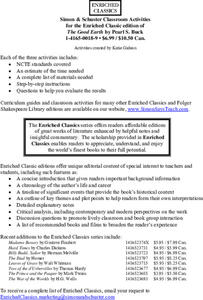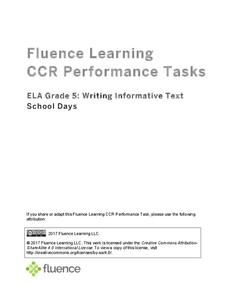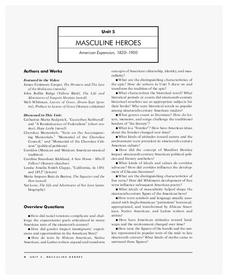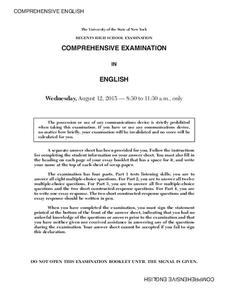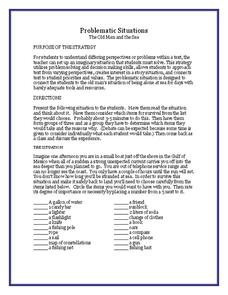Newseum
Slanted Facts and Slippery Numbers
The Internet is known as the information superhighway, but sometimes it's hard to know when to hit the brakes on unreliable sources. Using a well-rounded lesson plan, pupils read and summarize articles about the gender pay gap and...
Simon & Schuster
Classroom Activities for The Good Earth by Pearl S. Buck
An 11-page packet includes three activities to engage pupils in reading Pearl S. Buck's The Good Earth. To understand the historical context, class members research a list of topics related to Chinese history and culture. They then...
US House of Representatives
“‘The Negroes’ Temporary Farewell,” Jim Crow and the Exclusion of African Americans from Congress, 1887–1929
Despite some advances made during the Reconstruction Era following the Civil War, the period from 1887 through 1929, African Americans serving in Congress suffered severe setbacks due to Jim Crow Laws and voter suppression. Class members...
US House of Representatives
“The Fifteenth Amendment in Flesh and Blood,” The Symbolic Generation of Black Americans in Congress, 1870–1887
The reading of a contextual essay launches a study of Black Americans who served in Congress from 1870 through 1887. Young historians identify the African Americans who served during this period, investigate the ways they won national...
Curated OER
Our “Civilized” Society
The Scarlet Letter is the anchor text in a four-week unit that examines Hawthorne's novel through the lens of the intolerances found in a supposed civilized society. In addition to their reading, class members watch clips from...
Fluence Learning
Writing Informative Text: School Days
A three-part writing assessment challenges scholars to think critically about schools of the past and present. Learners read informative texts, answer questions to prepare for a discussion, research in small groups, complete a Venn...
US House of Representatives
Keeping the Faith: African Americans Return to Congress, 1929–1970
The third lesson plan in a unit that traces the history of African Americans serving in the US Congress examines the period from 1929 through 1970. After reading a contextual essay that details the few African Americans elected to...
Daughters of the American Revolution
Lesson 2: How Do We Determine the Value of Education?
Have women always had the same educational opportunities as their male counterparts? Young historians read an 1819 essay by Emma Willard on the state of female education in the 19th century before discussing their views regarding women's...
Curated OER
The Electric Hearth
Students examine popular media. For this media awareness lesson, students keep logs of their interactions with media and then write an essay regarding the data.
Curated OER
The Metamorphosis: Problematic Situation
Are you enjoying the use of all five senses? Imagine that you have to lose one of them; you can choose which one, but it's gone forever. Work through a lesson based on Franz Kafka's The Metamorphosis that asks class...
Great Books Foundation
Discussion Guide for Little Women
Start with the question in mind with a discussion activity on Louisa May Alcott's Little Women. With four focus questions, note-taking prompts, and discussion points, readers practice answering thematic questions based on textual evidence.
Prestwick House
Analyzing Multiple Interpretations of Literature
There is a reason why an Oscar is given each year for the Best Adaptation Screenplay. Adaptations are the focus of an exercise that asks class members to compare a work of literature with a least one adaptation of the work into a...
University of Arkansas
Assessment and Discussion
"Without concerned citizen action to uphold them (human rights) close to home; we shall look in vain for progress in the larger world. . ." Eleanor Roosevelt's comment is used to set the stage for the conclusion of a five-activity unit...
National Endowment for the Humanities
Martin Luther King, Jr. and Nonviolent Resistance
Was nonviolent resistance the best means of securing civil rights for black Americans in the 1960s? In this highly engaging and informative instructional activity, your young historians will closely analyze several key documents from the...
Global Oneness Project
Repairing the Fabric of Democracy
During elections, headlines constantly lament the issue of low voter turnout. Help class members understand why this is such an important topic with relevant articles, a discussion of both sides of the issue, and a reflective essay.
Annenberg Foundation
Masculine Heroes
What were the driving forces behind American expansion in the nineteenth century, and what were its effects? Scholars watch a video, read biographies, engage in discussion, write journals and poetry, draw, and create a multimedia...
Curated OER
Reading the Movies: Another Approach To Teaching Critical Thinking Skills And Writing
Students explore the elements of film to analyze character, action, and the themes in the movie, "Quiz Show." The lesson encourages students to make personal connections and real life applications as they view the movie, critically.
Curated OER
Food Myths Critical Thinking and Reading
Students read a series of statements made by students about the hazards and benefits of various foods. They distinguish the "facts: from "opinions" in the dialogue, summarize the facts in a short paragraph, and write an essay...
Curated OER
Ethical and Critical Thinking: Genetically Modified Food
High schoolers read statements representing different points of view on Genetically Modified Food. They identify the "facts" and "opinions" in each statement, and then briefly summarize the issue of Genetically Modified Food in a short...
New York State Education Department
Comprehensive English Examination: August 2015
Looking at literature through a critical lens helps readers connect the text to the larger world. An essay examining the theme "There is no ill in the world without a remedy" forms the main part of a sample comprehensive English...
National Endowment for the Humanities
Emulating Emily Dickinson: Poetry Writing
High schoolers analyze mood and voice in Emily Dickinson's poem, "There's a Certain Slant of Light." After the analysis, students write a poem of their own emulating the Dickinson poem, and then write a one-page essay describing what...
Social Media Toolbox
Social Media Roles
Social media has changed the news publishing process, so how does it affect school news publications? Lesson nine in a 16-part series titled The Social Media Toolbox explores the traditional publishing roles through the lens of social...
Curated OER
The Old Man and the Sea: Problematic Situations
Bring the drama of Ernest Hemingway's The Old Man and the Sea to class with a fun role-playing activity. Given a list of survival items, readers decide which items would be the most necessary for an adventure like...
Curated OER
Cloudy Days are for Reading and Writing
Students research weather proverbs and determine the scientific validity of 3 weather proverbs. They write an essay presenting their reasoning. They interview elderly people to graph the most frequently heard proverbs and theorize...



